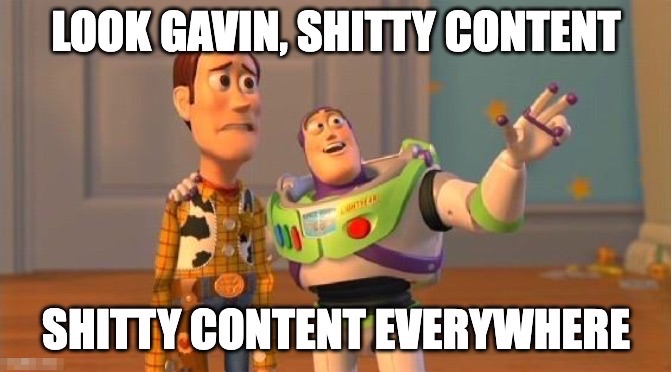If I read one more article proclaiming that AI will kill SEO, I’m going to lose it.
Okay perhaps I’ll only flip a couple of desks over, but it’s becoming annoying now.
SEO is not going anywhere.
Some people are making sweeping generalisations, layering them with assumptions and minimal firsthand experience, and then boldly proclaiming the demise of SEO.
So I wanted to set the record straight on what the future holds for SEO with AI in the mix. Brace yourself, because I believe I’m about to make a lot of sense…
AI’s Influence on SEO
The most significant recent shift in the area of SEO has been AI tools like ChatGPT. That’s unquestionable. These technologies are changing how people search for information and will directly influence SEO strategies.
Conversational AI offers a slightly new approach: users ask questions or describe their needs in a natural, conversational manner, and AI tools provide tailored answers. This ease of use is drawing search traffic away from traditional search engines. This much, I can agree on.
However, it is also important to remember as part of the SEO conversation that Google has been actively involved in AI research and development for many years.
They formally established its AI focus with the creation of Google Brain in 2011, a deep learning artificial intelligence research team at Google. This initiative marked a significant commitment by Google to the development of AI technologies.
Before this formal focus, Google had already been integrating AI into its products, such as the search engine’s algorithm improvements and ad targeting techniques.
Over the years, AI has become central to many of Google’s projects and products, including Google Assistant, autonomous vehicles through Waymo (a subsidiary of Alphabet, Google’s parent company), and various other machine learning projects.
SEO Strategies
Long-tail keywords and conversational queries must be prioritised now to capture search intent and reflect the way users naturally phrase their questions.
But then, this is nothing new, is it??
It’s always been essential to create comprehensive content that directly answers user queries, providing concise, reliable information that users expect from chatbots.
Structured data also plays a crucial role in ensuring that your content stands out and is easily recognised in traditional search engines and AI tools.
Furthermore, building a recognisable and trusted brand increases the likelihood that AI tools will cite your content as a trusted source.
While conversational AI might reduce traffic to websites for simple queries, it also offers new opportunities. By understanding this shift and refining SEO strategies accordingly, you can ensure your brand remains discoverable even as search behaviour evolves.
Content Creation
For better or worse, the surge in AI technology is revolutionising content creation. There’s no doubt about that.
Modern AI tools can quickly generate vast volumes of written material, enabling businesses to produce optimised articles, product descriptions, and FAQs efficiently. This opens new opportunities for scaling marketing efforts but introduces new challenges.
With AI, businesses can churn out content at unprecedented speeds, maintaining a consistent online presence.
AI-driven tools suggest keywords, structures, and styles that supposedly align with current SEO best practices (but rarely do).
Producing high-quality drafts quickly allows teams to focus on refining their brand voice and strategic campaigns. But then of course it needs the human touch.
This rapid production has two downsides: fiercer competition and really sh*tty content.

As more businesses adopt AI tools, the sheer quantity of content increases. Standing out requires prioritising unique, high-quality material that reflects expertise and provides distinctive value. While anyone can use AI for quick content creation, not everyone can build credibility and trust, as well as get it to rank.
To thrive, companies should focus on delivering comprehensive, authoritative content that goes beyond quick AI summaries. Incorporating unique insights such as original data and expert opinions helps distinguish your material from generic alternatives.
Balancing AI-generated content with human editing ensures authenticity and keeps the brand voice consistent. Crafting in-depth articles that fully answer user queries provides more substance and establishes the business as an expert.
In a world where content can be generated with a click, standing out requires creativity, authority, and a strong grasp of your audience’s needs and emotions. Those who leverage AI tools effectively while maintaining quality will gain a significant advantage.
Content Quality Standards
As AI-generated content becomes more prevalent, search engines are adapting to ensure users continue to receive high-quality results. With the sheer volume of automated material flooding the internet, search algorithms prioritise authoritative, human-written content.
For SEO professionals, this shift means doubling down on the principles of Experience, Expertise, Authority, and Trustworthiness (E-E-A-T).
- Experience: Refers to the extent to which the content creator has the necessary first-hand or life experience required for the topic.
- Expertise: Search engines value content written by knowledgeable sources. By showcasing subject matter expertise through detailed guides, well-researched articles, and original insights, websites can stand out from AI-generated summaries and provide more value to their audiences.
- Authority: Building authority involves establishing a credible brand that people trust. Citing reputable sources, gaining backlinks from respected websites, and consistently delivering reliable information are key components in boosting a website’s authority.
- Trustworthiness: Transparency and accuracy are crucial. Search engines place more emphasis on sites with transparent authorship, clear sourcing, and user reviews. Offering genuine, reliable advice helps build trust with both search engines and users.
In practice, this means creating original, comprehensive material to meet higher quality standards, infusing a distinctive brand voice into the content, and implementing stringent editing processes to ensure factual accuracy.
By prioritising E-E-A-T in content strategies, brands can navigate a landscape filled with AI-generated content and earn better search visibility.
Not many were doing it before anyway, and even less now with AI in the mix. So if you can do it now, you’ll be on to a winner.
Search Engines’ Own AI Integration
Major search engines like Google and Bing are integrating AI chat features directly into search results. Google’s “Search Generative Experience” (SGE) and Microsoft’s Bing AI chat use artificial intelligence to provide summarised answers at the top of the search page, offering users a quick, comprehensive response without requiring them to visit individual websites.
While convenient for users, this new feature presents challenges for SEO as it can reduce click-through rates to individual sites.
To adapt to this change and still stand out in search results, you should consider optimising for summaries by providing concise, authoritative responses to common questions. Direct answers using structured data and optimised headings can increase visibility in AI-generated excerpts. Focusing on high-quality content that prioritises E-E-A-T is crucial for this too, as this content is more likely to be recognised and summarised by search engines.
Implementing schema markup ensures search engines can quickly understand the structure and relevance of your content, positioning it as a reliable source for AI-generated answers.
Providing distinctive insights or original research sets your content apart from generic sources, while thought leadership articles can gain prominence in summaries when search engines recognise the unique value of your expertise.
Finally, improving engagement metrics like click-through rates, dwell time, and bounce rates signals to search engines that your site provides valuable, relevant information. You MUST consider UX. I already wrote here about how they should work in harmony.
 By understanding how these new AI features work and adjusting strategies accordingly, you can better position your content to be included in AI summaries. Staying relevant requires a combination of optimisation, structured data, and thought leadership that ensures your brand remains visible even as search engines evolve.
By understanding how these new AI features work and adjusting strategies accordingly, you can better position your content to be included in AI summaries. Staying relevant requires a combination of optimisation, structured data, and thought leadership that ensures your brand remains visible even as search engines evolve.
Conversational Queries
Users are now more inclined to phrase their queries like natural dialogue, asking questions the same way they would speak to another person. As a result, SEO strategies need to accommodate these conversational queries by focusing on long-tail keywords and understanding user intent.
Conversational queries tend to be longer and more specific than traditional keyword searches. Optimising content for long-tail keywords increases the likelihood of capturing search traffic from users who phrase their queries as full questions.
Tailoring content to address the underlying intent behind conversational searches involves deciphering whether users are looking for information, seeking transactional opportunities, or exploring options for specific actions.
Craft content that mirrors how people speak and phrase questions, using frequently asked questions (FAQs), how-to guides, and Q&A-style formats that are particularly effective. But again, make them authoritative.
Another point to note is that many conversational queries are location-specific, so ensure your business information is accurate across local listings. Optimising for near me” searches and other local queries helps attract nearby customers, even through AI queries.
By adjusting SEO strategies to accommodate conversational queries, businesses can better connect with users who are shifting to more natural, dialogue-like search habits.
Brand Awareness
Brand awareness will continue to play a crucial role in maintaining visibility. AI-driven search systems tend to pull data from well-established, trusted sources, meaning brands need to focus more on becoming recognisable and authoritative to be cited consistently.
Be sure to:
- Publish high-quality, well-researched content that demonstrates expertise in your industry.
- Providing valuable insights and original research can establish your brand as a leading voice that AI systems recognise.
- Ensure your brand identity – name, logo, and messaging – is consistent across all digital channels to reinforce credibility and help AI distinguish you as a reliable source.
- Encourage customer reviews, testimonials, and ratings to build a trustworthy online reputation. Positive user-generated content can be influential in positioning your brand as authoritative.
- Earn backlinks from reputable websites in your niche, as being cited by other authoritative sources signals credibility to AI systems and search engines.
- Regularly publish thought leadership content, such as guest articles, podcasts, and webinars, to boost your reputation and increase your chances of being referenced as a trusted source. Partner with influencers in your industry who align with your brand values to amplify your message and broaden brand recognition.
- Ensure your business information is accurate and up-to-date on all platforms, particularly local directories and social media. This clarity makes it easier for AI systems to confirm your brand’s authenticity.
By focusing on building brand awareness through authority, social proof, and thought leadership, your business can stand out as a reliable source that AI systems cite in their summaries.
This recognition not only helps maintain visibility but also fosters trust with your target audience, reinforcing your brand’s reputation in an AI-driven world.
New Opportunities For SEO
The advent of AI technology has introduced a wealth of powerful tools and features that SEO professionals can harness to refine their strategies. By using AI-driven platforms, marketers can identify even more new keywords, predict emerging trends, and analyse content gaps more efficiently than with manual research alone. This leads to more effective, data-driven decisions.
AI algorithms can analyse vast datasets to uncover new keyword opportunities. They identify long-tail keywords and semantic variations that may be overlooked in traditional research, offering insights into what potential customers are searching for.
By analysing historical data and user behaviour, AI tools can detect emerging trends and shifts in search intent, allowing businesses to adjust their content strategies proactively.
AI platforms can compare a website’s content to competitors’ to identify gaps or underserved topics. Filling these gaps provides valuable opportunities to address user needs that competitors may have missed.
A human needs to do all of these things, but AI can help to speed up the process a little.
(On this note, do NOT rely on AI to give you an SEO audit. It is simply NOT capable of it.)
As you will see, by integrating AI tools into their workflows, SEO professionals can streamline their research and adapt strategies with greater speed and precision. This leads to more efficient and impactful SEO efforts, allowing us to help you stay ahead.
Now… if SEO is dead then could I really have gone an informed rant about what you need to do next?


